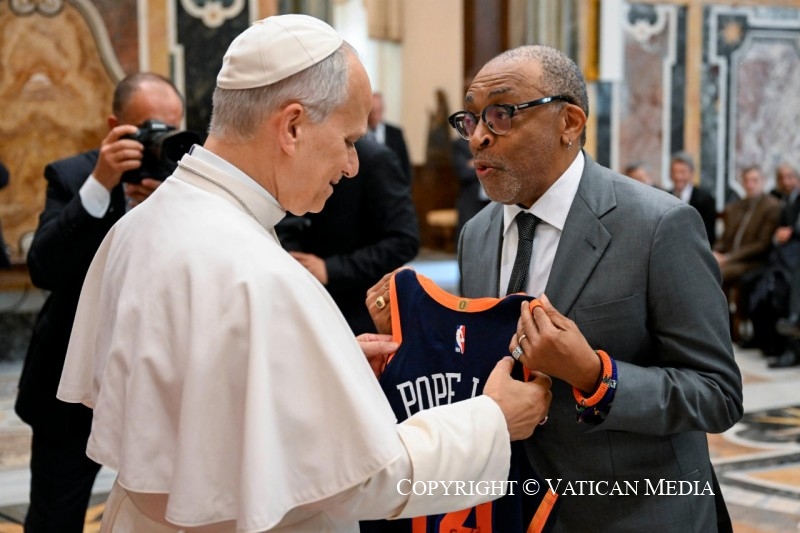Pope to directors and actors: ‘Do not be afraid to engage with the wounds of the world’
Leo XIV received more than 160 professionals on the 130th anniversary of the birth of cinema. He described it as an "act of love" that "must not shy away from the mystery of fragility". Its creators are "pilgrims of imagination", capable of "recognizing beauty even in the folds of pain". Drawing on the words of director David W. Griffith, he called on them to make it "an art of the Spirit”.
Vatican City (AsiaNews) – Pope Leo XIV met this morning in the Clementine Hall of the Apostolic Palace with more than 160 professionals from the world of cinema. The event was held on the 130th anniversary of the birth of the “seventh art,” which began in 1895 with the first screening by the Lumière brothers in Paris. To them—directors, actors, and technicians—Prevost recalled that despite its age, it remains “a young art, dreamy and a bit restless.” But also “a popular art in the noblest sense, born for everyone and speaking to everyone”, capable of “setting hope in motion”.
The pope had anticipated the gathering - promoted by the Dicastery for Culture and Education, in collaboration with the Dicastery for Communication and the Vatican Museums - with a video message in which he shared his four favorite feature films: It’s a Wonderful Life (1946) by Frank Capra, The Sound of Music (1965) by Robert Wise, Ordinary People (1980) by Robert Redford, and Life Is Beautiful (1997) by Roberto Benigni. “When the magic lantern of cinema lights up in the darkness, the gaze of the soul ignites at the same time”, Prevost continued. He then highlighted cinema’s ability to link “entertainment” to “a narration of the spiritual adventure of the human being”.
Cinema is an “act of love”, he said. For, as the great directors have shown, it “is capable of giving voice to the complex, contradictory, sometimes dark feelings that dwell in the human heart”. It is an art that “must not flee from the mystery of fragility: it must listen to it and know how to dwell before it”.
It was also on that “darkness” illuminated by the “magic lantern of cinema” that Prevost focused in his address to those present, including prominent figures such as American director Spike Lee and Italian actress Monica Bellucci. Entering that darkness - and the “silence” of the movie theatre - means “crossing a threshold”. “The eye grows attentive again, the heart allows itself to be touched, the mind opens to what it had not yet imagined”, the pontiff said. Before a cinematographic work, “concentration” is required, he added, especially in a world where “the flow of information is constant” and device screens are “always on”. “Cinema is far more than a simple screen: it is a crossroads of desires, memories, and questions”, he said.
Furthermore, the venues that host screenings are “the beating hearts of our communities, because they contribute to their humanization”, Leo XIV affirmed, attributing an important role in the vitality of cities to “cultural spaces”. “We must inhabit them, build relationships within them, day after day”, he urged. Even though, he admitted, movie theatres are experiencing a “worrying erosion”, reflecting a situation of “danger” in which the art and experience of cinema itself now finds itself.
In the Jubilee Year dedicated to hope, the pope continued, the presence and “daily artistic work” of directors, actors, and film crews represent “luminous signs”. Cinema professionals are “pilgrims of imagination, seekers of meaning, narrators of hope, messengers of humanity”, Prevost said. They live a “pilgrimage into the mystery of human experience”, traversing it with “a penetrating gaze, capable of recognizing beauty even in the folds of pain, hope within the tragedies of violence and war”, the pontiff affirmed.
Pope Leo XIV recalled that “recovering the authenticity of the image in order to safeguard and promote human dignity is within the power of good cinema and of those who create and embody it”. And he shared an invitation with the practitioners of this more-than-century-old art: “Do not be afraid to confront the wounds of the world. Violence, poverty, exile, loneliness, addictions, forgotten wars are wounds that ask to be seen and told. Great cinema does not exploit suffering: it accompanies it and investigates it”.
In his address, Prevost added that the Church “looks with esteem upon you who work with light and with time, with the face and with the landscape, with words and with silence”. “Cinema is a laboratory of hope, a place where human beings can once again look at themselves and their destiny”, he said. And recalling the words of David W. Griffith (1875–1948), the great American producer and director: “What is missing in modern cinema is beauty - the beauty of the wind moving through the trees”. Then, addressing the practitioners of the cinematic arts, he concluded: “Dear masters, old and new, make cinema an art of the Spirit”.
14/06/2019 15:41
12/12/2017 12:44







.png)










